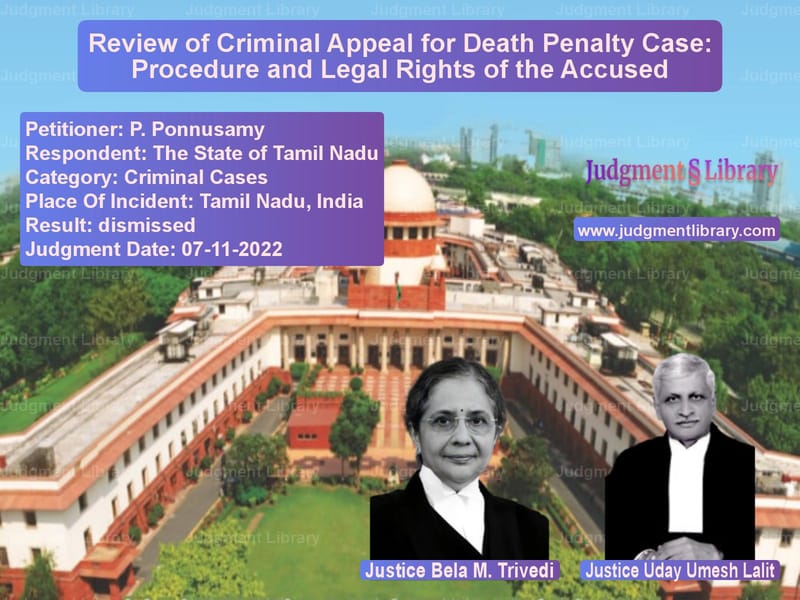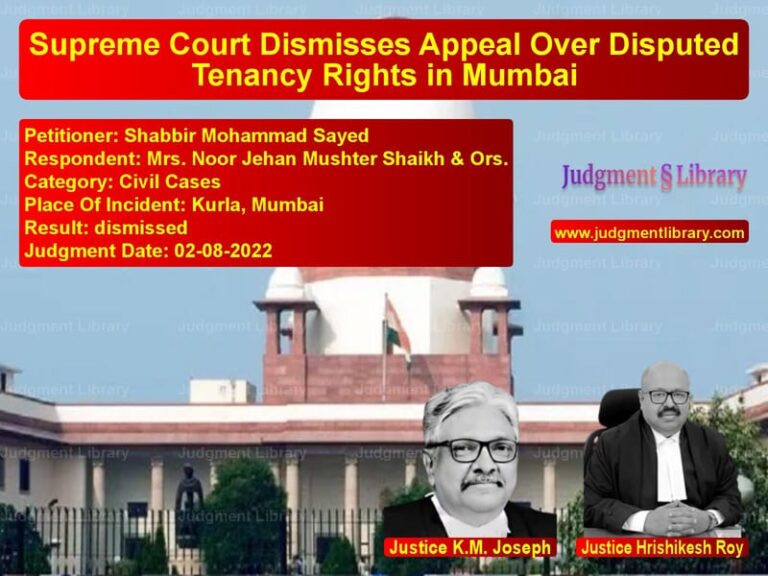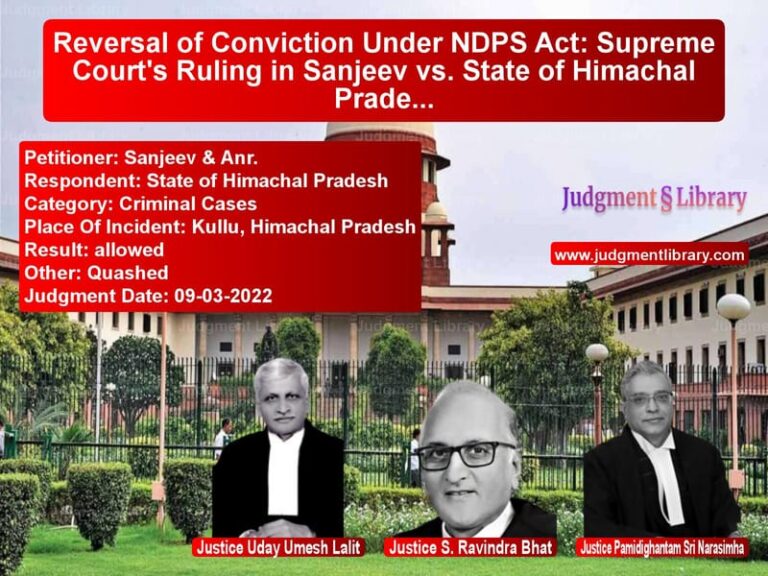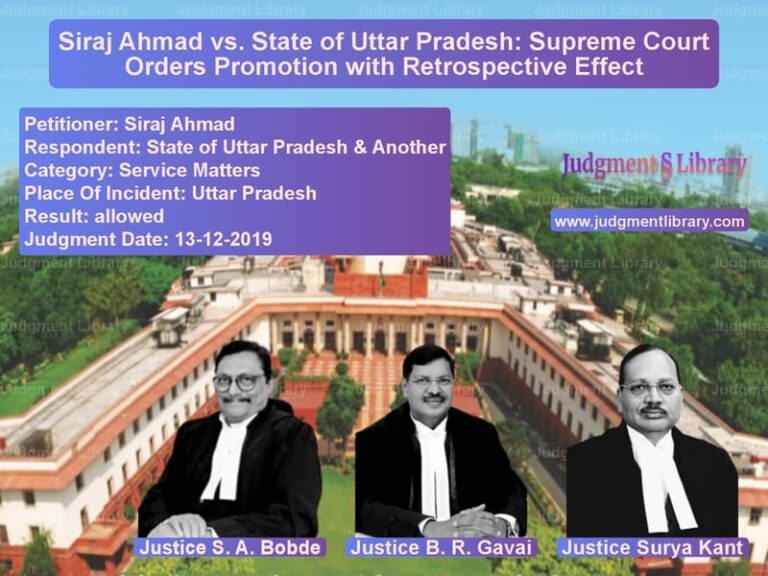Review of Criminal Appeal for Death Penalty Case: Procedure and Legal Rights of the Accused
The Supreme Court of India recently ruled on the Criminal Appeal of P. Ponnusamy v. The State of Tamil Nadu, which concerns the appeal filed by the accused against the orders passed by the Madras High Court in a death reference case. The appellant, P. Ponnusamy, along with other accused, had been convicted under sections of the Indian Penal Code (IPC), including Section 302 for murder, Section 120B for conspiracy, and Section 109 for abetment. The appeal is significant for its insights into the rights of the accused in criminal trials, specifically concerning the furnishing of documents during investigations and trials, and the procedural guidelines for death penalty cases.
Background of the Case
The case involved a group of individuals, including the appellant, who were convicted for their roles in a conspiracy that led to a murder. The Sessions Court had imposed the death penalty on some of the accused, including P. Ponnusamy. The death sentence was confirmed by the High Court of Madras. The case was then referred to the Supreme Court for review, with the key issue being the adequacy of documents provided to the accused and the handling of their rights during the trial.
The legal proceedings before the High Court were marked by delays, with several adjournments requested by the defense counsel. The appellant’s counsel raised concerns regarding documents in possession of the prosecution that were not furnished to the defense. These documents, they claimed, were essential for the fair adjudication of the case and the defense’s right to a fair trial. They cited the earlier ruling in the Manoj & Ors. v. State of Madhya Pradesh case, where this Court had mandated the disclosure of all documents seized during the investigation, even if not relied upon by the prosecution.
Petitioner’s Arguments
The appellant, P. Ponnusamy, argued the following points:
- Non-Furnishing of Documents: The appellant’s counsel argued that the defense was not provided with several key documents seized during the investigation that were not relied upon by the prosecution. These documents, the defense claimed, were crucial for the preparation of a fair defense and needed to be disclosed.
- Failure to Apply Earlier Court Rulings: The appellant’s legal team pointed out that the ruling in the Manoj case had clearly outlined the prosecution’s duty to provide all documents, including those not used in the trial, to ensure the accused’s right to a fair trial. They argued that the High Court’s refusal to delay the case to allow for these documents to be provided violated the appellant’s rights under Article 21 of the Constitution.
- Request for Stay of Proceedings: The appellant’s counsel requested a stay of the proceedings until the documents were provided, arguing that without access to these documents, it was impossible for the defense to present a complete case.
Respondent’s Arguments
The respondent, the State of Tamil Nadu, represented by the prosecution, countered the appellant’s arguments with the following:
- Adequate Disclosure: The State argued that all necessary documents and materials had already been provided to the defense as required by Section 207 of the CrPC. The prosecution maintained that no documents were withheld and that the appellant was given full opportunity to contest the evidence.
- Misinterpretation of Previous Rulings: The respondent claimed that the appellant’s reliance on the Manoj ruling was misplaced, as the case did not apply to the circumstances of this case. The prosecution contended that no documents had been suppressed, and the documents requested were irrelevant to the trial.
- Delay in Filing Request: The State argued that the appellant had made the request for documents too late in the process, after the final hearing had been scheduled. The prosecution claimed that the delay was an attempt to derail the timely resolution of the case.
Supreme Court’s Observations
The Supreme Court, in its judgment, made the following observations:
- On the Right to Fair Trial: The Court reaffirmed the importance of the right to a fair trial under Article 21 of the Constitution of India. The Court emphasized that the defense must have access to all relevant materials in the possession of the prosecution, even if those materials are not relied upon in the case.
- On the Importance of Document Disclosure: The Court agreed with the appellant’s contention that the prosecution had a duty to disclose all documents seized during the investigation, whether relied upon or not. The Court referred to the ruling in the Manoj case, which had made it clear that such disclosure was part of ensuring a fair investigation and trial.
- On the Delay Tactics: While the Court recognized the appellant’s right to seek necessary documents, it also noted that the timing of the request was problematic. The Court emphasized that the defense had multiple opportunities to raise these concerns before the High Court, but chose to delay the process, which the Court deemed inappropriate.
Supreme Court’s Verdict
The Supreme Court ruled as follows:
- The Court dismissed the appellant’s request for a stay on the proceedings, agreeing with the High Court’s decision to proceed with the hearing despite the pending request for documents.
- The Court did not find merit in the appellant’s argument that the documents had been withheld. It concluded that the documents necessary for the defense had been provided in accordance with the law, and the appellant had not demonstrated how the lack of the additional documents would affect the fairness of the trial.
- The Court emphasized the need for the trial courts to ensure timely and transparent disclosure of documents to the defense in criminal trials, but also noted that such requests should be made promptly and at the appropriate stage in the proceedings.
- Ultimately, the appeal was dismissed as the Court found no valid reason to interfere with the High Court’s order or delay the proceedings any further.
Key Takeaways from the Judgment
- Right to Fair Trial: The case underscores the importance of the right to a fair trial and timely access to evidence for the accused, especially in cases where documents may have exculpatory value.
- Timely Disclosure of Evidence: The judgment highlights the legal obligation of the prosecution to provide all documents related to the case to the defense, ensuring transparency and fairness in the trial process.
- Importance of Legal Procedure: The Court made it clear that procedural fairness must be maintained, but at the same time, delays in raising issues or requests cannot be used to obstruct the judicial process.
- Adherence to Procedural Guidelines: The ruling reflects the necessity for strict adherence to procedural guidelines in criminal trials, ensuring that the rights of the accused are balanced with the need for timely proceedings.
Implications of the Judgment
This ruling has significant implications for criminal trials, particularly regarding the disclosure of evidence and the rights of the accused:
- It reinforces the requirement that the prosecution must provide all relevant documents, even if they are not used in court, ensuring that the accused has access to all material that could affect the trial’s outcome.
- The judgment sets a precedent for addressing delays in legal proceedings, stressing that the right to a fair trial should not be used as a pretext for delaying justice.
- It highlights the role of trial courts in ensuring transparency and fairness, especially in cases involving serious criminal charges such as the death penalty.
Conclusion
The Supreme Court’s decision in P. Ponnusamy v. The State of Tamil Nadu reaffirms the principles of fair trial and the rights of the accused to timely disclosure of documents. While it is essential to protect the rights of the accused, it is equally important to ensure that delays and procedural inefficiencies do not hinder the delivery of justice. The Court’s ruling serves as a reminder of the delicate balance between safeguarding individual rights and ensuring the timely and efficient administration of justice.
Petitioner Name: P. Ponnusamy.Respondent Name: The State of Tamil Nadu.Judgment By: Justice Bela M. Trivedi, Justice Uday Umesh Lalit.Place Of Incident: Tamil Nadu, India.Judgment Date: 07-11-2022.
Don’t miss out on the full details! Download the complete judgment in PDF format below and gain valuable insights instantly!
Download Judgment: p.-ponnusamy-vs-the-state-of-tamil-n-supreme-court-of-india-judgment-dated-07-11-2022.pdf
Directly Download Judgment: Directly download this Judgment
See all petitions in Bail and Anticipatory Bail
See all petitions in Cyber Crimes
See all petitions in Terrorist Activities
See all petitions in SC/ST Act Case
See all petitions in Judgment by Bela M. Trivedi
See all petitions in Judgment by Uday Umesh Lalit
See all petitions in dismissed
See all petitions in supreme court of India judgments November 2022
See all petitions in 2022 judgments
See all posts in Criminal Cases Category
See all allowed petitions in Criminal Cases Category
See all Dismissed petitions in Criminal Cases Category
See all partially allowed petitions in Criminal Cases Category







